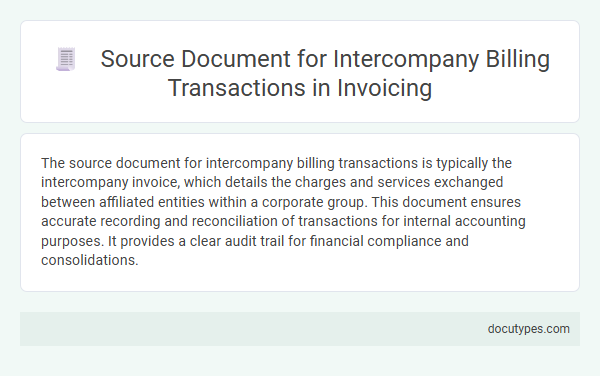The source document for intercompany billing transactions is typically the intercompany invoice, which details the charges and services exchanged between affiliated entities within a corporate group. This document ensures accurate recording and reconciliation of transactions for internal accounting purposes. It provides a clear audit trail for financial compliance and consolidations.
Introduction to Intercompany Billing Transactions
Intercompany billing transactions facilitate the transfer of goods or services between different entities within the same organization. These transactions require accurate source documentation to ensure proper accounting and compliance.
- Source Document Importance - It provides a legal and financial record for intercompany charges.
- Invoice as Source Document - The intercompany invoice serves as the primary document driving the billing process.
- Data Accuracy - Source documents ensure transactional data is recorded with correct details such as amounts, dates, and entities involved.
Accurate source documents streamline reconciliation and support audit requirements for intercompany billing.
Importance of Source Documents in Invoicing
| Topic | Details |
|---|---|
| Source Document for Intercompany Billing Transactions | The primary source document for intercompany billing transactions is the intercompany invoice. This document records details such as the goods or services exchanged, quantities, prices, and the related terms agreed upon between affiliated entities within the same corporate group. |
| Importance of Source Documents in Invoicing | Source documents serve as the foundational data in the invoicing process. They ensure accuracy by providing verifiable evidence for each transaction, enabling proper accounting, reconciliation, and auditing. Maintaining clear and detailed source documents safeguards against disputes and supports compliance with regulatory requirements. For Your business, relying on precise source documents enhances transparency and streamlines intercompany billing procedures. |
Types of Source Documents Used for Intercompany Billing
The source document for intercompany billing transactions is essential for recording and verifying financial exchanges between related entities within a corporation. These documents provide the necessary details to ensure accurate billing and reconciliation across company divisions.
Common types of source documents used for intercompany billing include purchase orders, invoices, and delivery receipts. Each document contains specific information such as transaction dates, amounts, and descriptions that support intercompany cost allocations and accounting entries.
Key Components of Intercompany Billing Source Documents
The source document for intercompany billing transactions is a crucial record that initiates and supports internal charges between affiliated companies. It ensures transparency and accuracy in tracking intercompany sales and expenses.
Key components of intercompany billing source documents include the transaction date, involved entities, description of goods or services, and agreed pricing. These elements guarantee proper documentation for accounting and audit purposes.
Standard Formats for Intercompany Billing Documentation
The source document for intercompany billing transactions is typically an intercompany invoice that details the goods or services exchanged between affiliated entities. Standard formats for intercompany billing documentation include purchase orders, delivery notes, and detailed invoices, which ensure consistency and compliance across departments. These documents facilitate accurate financial recording and auditing within multinational corporations and complex organizational structures.
Workflow of Source Document Creation for Intercompany Invoices
What is the source document for intercompany billing transactions? The source document for these transactions is typically the intercompany invoice generated within the company's internal accounting system. This invoice serves as a formal record of charges between different entities of the same organization.
How does the workflow of source document creation for intercompany invoices operate? It begins with the identification of the transaction between related entities, followed by the preparation of the intercompany invoice reflecting the agreed-upon goods or services. After approval, the invoice is posted to the accounting system, enabling accurate financial tracking and reconciliation across departments.
Compliance and Audit Requirements for Source Documents
The source document for intercompany billing transactions is essential for maintaining compliance and meeting audit requirements. Proper documentation ensures accuracy and transparency in financial reporting.
- Invoice Detail - The source document must include clear identification of involved parties, transaction amounts, and billing dates.
- Compliance with Regulatory Standards - Documentation needs to adhere to relevant accounting standards and legal regulations governing intercompany transactions.
- Audit Trail - Source documents function as verifiable evidence to support financial statements during internal and external audits.
Challenges in Managing Intercompany Billing Documents
The source document for intercompany billing transactions is typically the intercompany invoice, which details the goods or services exchanged between affiliated entities. Managing these documents presents challenges such as ensuring accuracy in cost allocation, maintaining consistency across different accounting systems, and reconciling discrepancies promptly. Effective handling of intercompany billing documents is crucial to streamline financial reporting and compliance within multinational corporations.
Best Practices for Source Document Management in Invoicing
The source document for intercompany billing transactions typically includes detailed invoices or billing statements issued between corporate entities. Proper management of these source documents ensures accuracy and compliance in financial reporting.
Effective source document management in invoicing reduces errors, improves audit trails, and facilitates timely reconciliation of intercompany accounts.
- Maintain Original Invoices - Keep copies of original invoices as primary evidence for each intercompany transaction to support accurate record-keeping.
- Use Standardized Formats - Implement consistent document formats across all entities to streamline processing and minimize discrepancies.
- Ensure Timely Documentation - Capture and record source documents promptly to enhance transaction visibility and support prompt dispute resolution.
What Is the Source Document for Intercompany Billing Transactions? Infographic

